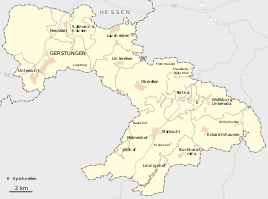Wilhelmsthal (Gerstungen)
|
Wilhelmsthal
community Gerstungen
Coordinates: 50 ° 55 ′ 6 ″ N , 10 ° 18 ′ 23 ″ E
|
|
|---|---|
| Height : | 325 m above sea level NN |
| Incorporation : | January 1, 1994 |
| Incorporated into: | Eckardtshausen |
| Postal code : | 99834 |
| Area code : | 036925 |
|
Wilhelmsthal in the east of the municipality
|
|
|
The forest house houses an art association
|
|
Wilhelmsthal is a district of Eckardtshausen in the Gerstungen municipality in Thuringia .
geography
The place Wilhelmsthal is located in the western part of the Thuringian Forest , in the valley of the Elte . Wilhelmsthal is about seven kilometers (as the crow flies ) east of Marksuhl, three kilometers east of Eckardtshausen, about 13 kilometers north of the district town of Bad Salzungen and about six kilometers south of Eisenach . The Wilhelmsthal hunting lodge with the Wilhelmsthaler See , which is surrounded by a landscape park, belongs to the village of Wilhelmsthal .
history
Wilhelmsthal, now part of Eckardtshausen, goes back to the village of Wintershusen mentioned in 1349 . This was located on the edge of a forest district known as Winterkasten - which spread from the Werra near Bad Salzungen, over the western part of the Moorgrund, Graefen-Nitzendorf , Oberrohn , Möhra , Kupfersuhl , Wackenhof and Eckardtshausen to the Rennsteig and for the operation of the saline from salting brought the firewood. In the 16th century, mining and smelting of copper ores began south and west of Wilhelmsthal near Kupfersuhl, the Wackenhof and the forest town of Attchenbach . Around the same time, a ducal wilderness barn was built near Wintershausen , later a hunting lodge and around 1700 Wilhelmsthal Castle, built by Duke Johann Wilhelm , whose name the place took over. The dukes' passion for hunting prevented an expansion of mining activities. In the 18th century, an extensive forest area was fenced in as a hunting area and was no longer allowed to be entered by the inhabitants of the surrounding communities. At the instigation of the Großherzoglich-Sächsische Forstlehranstalt Eisenach , the remaining part of the Wilhelmsthaler Forste (total size 2131 hectares) was taken over as teaching forest and scientifically documented for the first time. On the outskirts of the former Wintershausen settlement, a ducal forester's house and the capercaillie as a travel hostel were established as early as the 16th century . This small settlement was enlarged to 6 houses with 24 inhabitants by the arrival of further forest workers by 1860. Johann Wolfgang von Goethe was often a guest in Wilhelmsthal and described the Wilhelmsthal landscape in his elective affinities .
The “Wilhelmsthal Children's Village” was opened on September 27, 1947; it was a home for war orphans used by the People's Solidarity and the state administration - similar to the SOS Children's Villages. In the 1950s, children and young people were brought up in line with the state educational doctrine. They lived with their tutors in a building complex of the administrative and economic area of the former Wilhelmsthal Palace. The facility was later renamed the Ernst-Thälmann Children's Home.
During the GDR era there was the pioneer holiday camp “ Maxim Gorki ” in Wilhelmsthal . On July 17, 1951, State Council Chairman Walter Ulbricht visited the Maxim Gorki pioneer camp and the “Nikolai Ostrowski” children's camp during a spa stay in Bad Liebenstein .
On the night of June 14th to 15th, 1980, Wilhelmsthal, especially the camping site at Altenberger See , was hit by a severe storm. A tornado in the upper range of strength F1 caused severe damage in the forests and claimed six lives. Another nine people were injured, some seriously.
Attractions
- Wilhelmsthal Palace was built by Duke Johann Wilhelm from 1699 to 1719 , was initially a children's home in GDR times and later a special school with boarding school.
- Wilhelmsthaler See
- Karthäuserberg with the Schwalbennest viewpoint above the Wilhelmsthaler See.
- High forest grotto below the Hohe Sonne .
Another architectural monument in the district is the Jägerhof , which is privately owned.
traffic
Road traffic
Wilhelmsthal is located directly on the Bundesstrasse 19 in the Eisenach - Meiningen section . Via the state road 3020 you reach the federal road 84 , section Eisenach - Marksuhl via Wolfsburg-Unkeroda in Förtha .
Transportation
The following bus routes run by the Verkehrsgemeinschaft Wartburgregion (VGW) operate to Wilhelmsthal :
| line | Driving distance | operator |
|---|---|---|
| 183 | Eisenach - Wilhelmsthal - Förtha - Gerstungen | Traffic Werra OHG |
| 190 | Eisenach - Wilhelmsthal - Etterzüge - Bad Liebenstein - Bad Salzungen | Wartburgmobil transport company |
| 195 | Eisenach - Wilhelmsthal - Etterzüge - Bad Liebenstein | Wartburgmobil transport company |
Personalities
- Johann Conrad Sckell (1768–1834), garden inspector in Belvedere near Weimar
literature
- Michael Köhler: A new district of Eisenach. Eckhardtshausen - past and present . In: Reinhold Brunner (ed.): Eisenach year book . tape 1993 . Hitzeroth, Marburg 1993, ISBN 3-89398-141-1 , p. 129-130 . (The incorporation to Eisenach mentioned here did not materialize, however.)
- Horst H. Müller: travel guide Thuringian Forest and peripheral areas. 1977, p. 279 ff.
Web links
Individual evidence
- ↑ Official topographic maps of Thuringia 1: 10,000. Wartburgkreis, district of Gotha, district-free city of Eisenach . In: Thuringian Land Survey Office (Hrsg.): CD-ROM series Top10 . CD 2. Erfurt 1999.
- ↑ Memory of a contemporary witness
- ↑ Facebook entry
- ^ Report on the preparations for the visit in the AWE company newspaper DER MOTOR of July 13, 1951
- ↑ http://www.tornadoliste.de/19800614eisenach.htm


